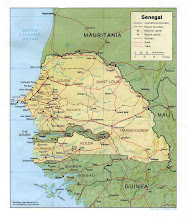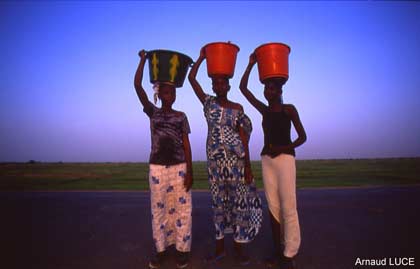Tuesday, April 22, 2008
I came here interested in ventures/collaborations/projects involving solid waste management in Senegal. From my advance research on the subject, a mystery remained about the fate of the AMA project here. The multi-million dollar, 25-year AMA project, the World Bank’s most significant waste management project in Africa, started with competitive bidding four or five years ago. The Italian company AMA won the contract to collect the entire Dakar region, build a transfer station and develop a landfill to replace the out-of-control, polluting Mbeubeus dump. But suddenly after the contract had been implemented for a couple year, the project simply ended. The government stopped payments on its contract, and presumably the bank loan. It was never clear why. Today I spoke with Christian Diou, the World Bank’s infrastructure manager for Dakar. He gave the bank’s understanding of the project breakdown—they don’t know either. Not much more than a year ago, he says, the government simply pulled its payments and terminated the contract. The garbage trucks and facility plans were stopped in their tracks. There was no explanation given by the Ministry of Environment which handled the contract. However, my Senegalese sources, and hints from the internet, indicate that the problem had something to do with labor; that unions formed of the waste workers hired by AMA made unmet demands. Nor should it go unnoticed that once the AMA contract was breached, the French firm, Veolia, moved in to manage the easy collection in downtown Dakar… Perhaps here as in California garbage, like politics, is always local. (Or maybe that French sense of the colonial “droit de seigneur” asserting itself under the table.) Since the AMA meltdown, the central government, says Mr. Diou, has enacted the devolution of waste management authority to the local “commune” governments of Dakar and nearby Rufisque. Those two communes are working together loosely to handle or contract waste collection and management. The result is apparently a patchwork of waste management that the central government has left (perhaps consciously) little understood or known…
Earlier in the day we met with the Ministry of Environment. After first greeting the minister himself, he passed us off to his sub-minister with the garbage portfolio. The one clear message I got from the minister himself was that Mbeubeus must close. Later today I learned from Mr. Diou why the government is so decided to get rid of Mbeubeus—the huge dump is smack in the way of the showcase coastal highway that is the Wade administration’s highest priority public project. The Mbeubeus closure is one waste project that the World Bank and the Senegal government can both get behind, says M. Diou, and the bank will help fund those efforts. But I got the strong impression that further World Bank involvement in waste collection and management here is unlikely—once burned as they were.
Wednesday, April 23, 2008
Dakar's mysterious disappearing waste management
Labels:
AMA,
Dakar,
environmental,
landfill,
Mbeubeus,
Rufisque,
World Bank
Subscribe to:
Post Comments (Atom)



No comments:
Post a Comment